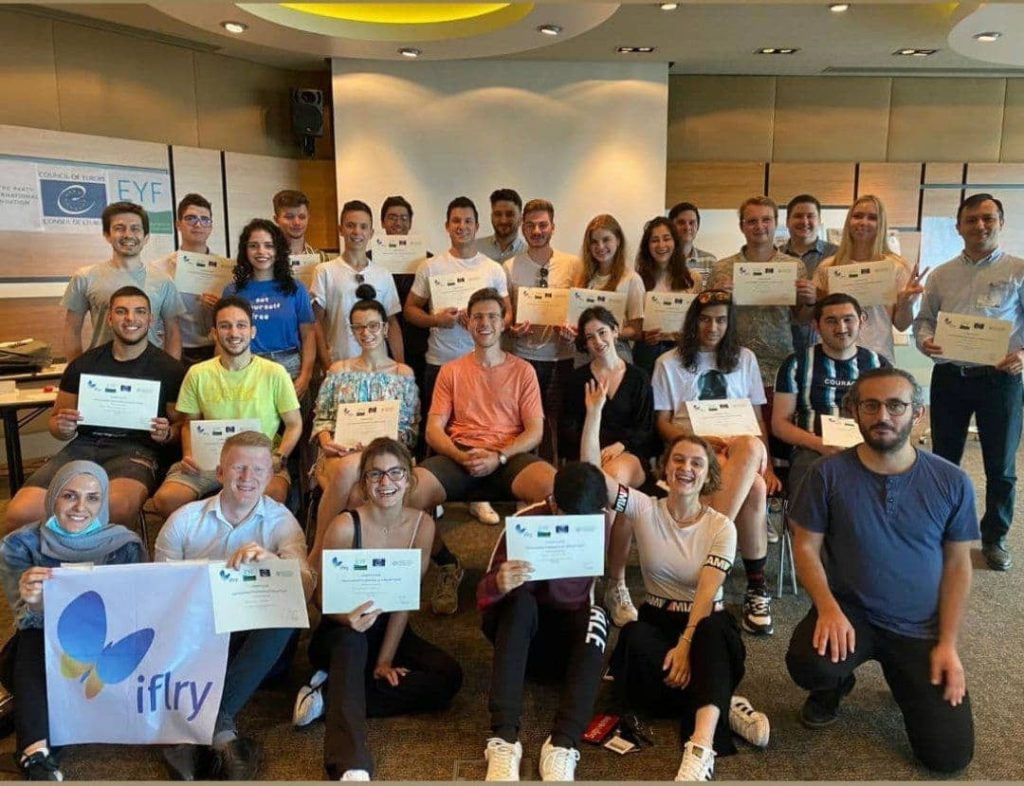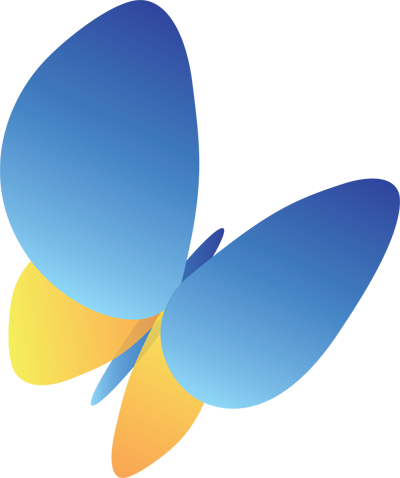July 2021, Istanbul

The first seminar of the work plan took place in Istanbul, gathering 25 participants from 14 countries, including Turkey, Azerbaijan, Albania, Ukraine, Germany, Bulgaria, Jordan, Lebanon, Belarus, Romania, and The Netherlands. The Seminar took place in Istanbul. We took safety considerations when picking the hotel and the seminar room, since this was the first on the ground big activity we conducted since January 2020. The event was rescheduled several times due to the pandemic.
The seminar program, nonetheless, remained as planned, we started with a half day that took place on the arrival day of the participants, then conducted two full training days, then we concluded the seminar with a half day, which was the day of departure as well.
The seminar started with an introductory session that included a Kahoot quiz informing the participants about our partners of this event, the CoE, EYF and the Center Party international Foundation from Sweden.
The focus of this seminar was discussing with the participants the various aspects of Leadership in Civil Society, what they consider as important skills and traits of a civil society leader. We started the seminar with a reflection on the meaning of being a leader, we asked the participants some brainstorming questions on the characteristics of leadership, are leaders born or made, etc. then after the brief discussion we sent the participant into groups to discuss the characteristics THEY would like to see in themselves or in others as leaders, that includes skills the leader in Civil society should have and the and traits they should work on, Participants then presented to the rest of the group their findings which sparked a discussion that helped set the tone of the seminar, namely that they, the youth, are redefining what it means to be a leader.
The seminar continued with another session on the different styles of civil society organizations, and the historic phases that they erupted in, discussing mainly the different styles of leadership that these civil society groups had and how they generally were organized.
Participants afterwards were asked to participate in a simulation, they were divided into several groups such as (the Government, a Social movement, two political Parties, Media, and active citizens) the social movement group task was to “take their ideas to the street” protesting in front of the government for a cause of their choice, other groups were asked to prepare their strategies on the ways they want to react to the upcoming social movement. The guided simulation sparked many interactions among the groups, which helped them identify and map different stakeholders of civic activism in an immersive experience that sparked an active reflection session debriefing the simulation.
The seminar started the third day with two civil society experts who joined online, talking to the participants about the motivation that drives them to be active in the civil society, the challenges they face in promoting their cause, and how they try overcoming those challenges.
A long Skills-lab session started afterwards, where participants where divided into three groups visiting three training station in World Café like rotation. The three training sessions were on Public Speaking, and community and network building.
In the last afternoon session of the third day, we were joined by three speakers from Turkey, telling us about their experience in the civil society. Very interesting stories on the challenges they and their colleagues are facing, how they function in a very challenging environment, which was inspirational for the group, the speakers then joined us for dinner, which gave the participant the chances to ask them more questions in a more informal setting.
The final day started with an “open Space on Speed session” where participants shared skills and other insights of their work with the rest of the group, very important skills complemented the offering of the seminar, such as the use of social media in civic activism, and insights on civil society in different countries such as China.
Participants then joined in for a “BootCamp Finale” session where they in world café session gathered the knowledge and impressions they gained during the seminar to develop the Starter Pack for Civic Activists worldwide.
How?
The activity has three main stages – preparatory, delivery and follow up. The preparatory stage included selection and preparation of the team from the IFLRY Pool of Trainers, we also saw the need to invite an external speaker on the topic of civic activism.
Team met several times online before the seminar (via Zoom) and followed up almost in daily basis with each other on Telegram and WhatsApp groups. They also shared a Gdrive folder to exchange on the content of the seminar. The team discussions focused heavily on studying the profiles of the participant and adjusting the offerings of the seminar, based on what would be more relevant to the participants. Team then divided roles among them where the used the Buddy System – with one lead trainer/facilitator and at least one supporting person on each assignment.
The team assembled two days earlier in Istanbul, as we saw the need to extensively work on connecting the seminar sessions to each other, which required long discussions on the ground before the seminar.
During the seminar, the team used various training methodologies, featuring mainly the NFE method, where we tried to engage the participants in different working group styles, individual, pairs and groups reflections, different sizes of groups interactions to ensure that all participants were included in the seminar.
Participants were also asked after the seminar to continue working on the starter kit they want to share with civic activists worldwide, each group delivered a document on the tips/dos for a civil society. leader, i.e. defining what it means to be a leader.
Added value ?
This WorkPlan is quite different than our previous workplans in the fact that all seminars share a common style and theme, yet every seminar can stand on its own. Nevertheless, as the first seminar of a workplan of this type, it was of a great added value to the rest of the workplan.
The seminar started with a session on defining the skills and traits of an ideal leader, observing the discussion helped the team transfer this knowledge, and fine tuning this session for the future seminars of the event.
The starter kit that is being developed from this seminar is an important tool to achieving the goals of the work plan. Participants in three groups collected the learning of this seminar in three different fields; the first group tried to ask the question: “How to connect with your community/engage with public?” gathering all the skills they discussed or observed during the seminar, such as messaging, the use of social media, etc. the second group tried to tackle an important question in the international youth field of work, which is “ How to transfer experiences from other contexts to local reality?” helping themselves and other participants to find a way to gather the most benefit from the seminars they are attending within this workplan and IFLRY in general, the last group answered the question How to reflect the liberal values that iflry stands for, such as defending human rights, into civic activism?. The start kit will be further developed through an online phase, gathering the results of the WP activities into a comprehensive starter kit on different fields of youth leadership.
Being the first in real life seminar in a very long time, and in the “new reality”, there were great learnings from the seminar, especially on the logistical level, the way we organize the seminar in a pandemic, arrival and departure instructions, the online expert session, and even testing the participants for travel purposes were new practices that we implement for the first time, and reflected in the way we conducted the other seminars we conducted this year so far.
Who
the team was mainly formed from the IFLRY Pool of Trainers which is the essential instrument of the Federation to deliver the NFE activities and is managed and run to ensure the quality and diversity of NFE.
